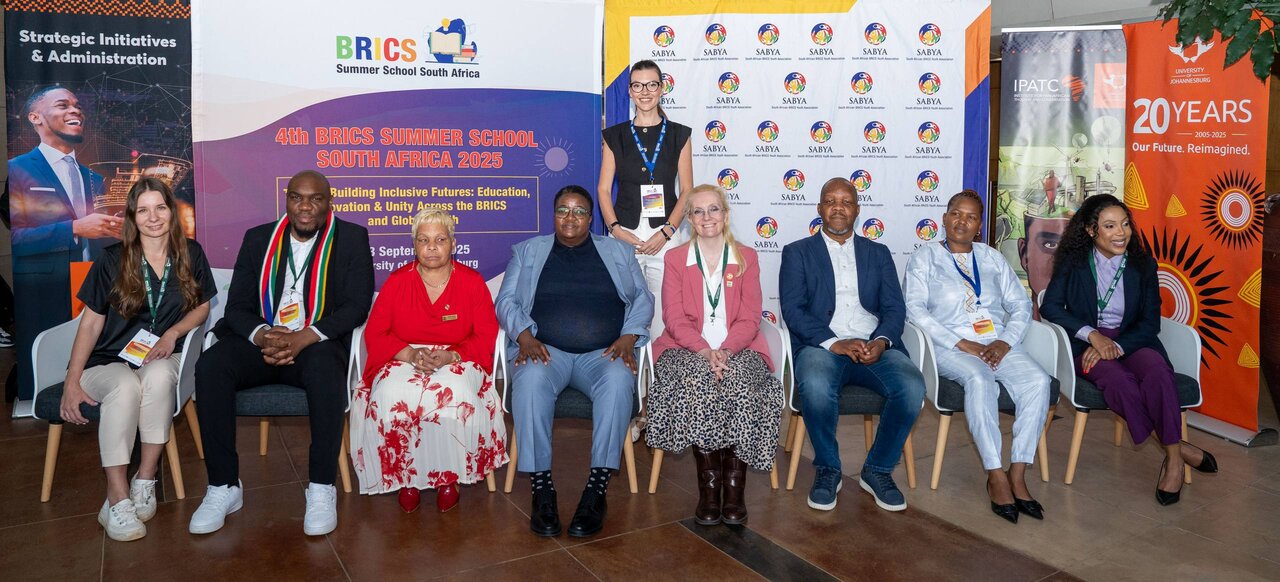BRICS Summer School opens with calls for alternative narratives

JOHANNESBURG – The first day of the BRICS Summer School unfolded with a sense of urgency in the city of Johannesburg in South Africa. Scholars and young leaders from across the Global South gathered to discuss alternative narratives in international relations, the deepening of intra-BRICS cooperation, and the role of youth in shaping the future of this rapidly evolving bloc.
The timing could hardly be more symbolic. As the Shanghai Cooperation Organization (SCO) Summit took place in Tianjin — another forum for non-Western cooperation — the BRICS Summer School highlighted the growing momentum of multipolar institutions that seek to balance the inequities of the current world order.
Correcting the failures of today’s leaders
South African academic Prof. Victoria Graham opened by stressing that BRICS must not only critique the failures of today’s leaders but also build alternatives. “We need alternative viewpoints, alternative narratives” in global politics, and the involvement of young people to carry BRICS into the future, she argued.
Prof. Siphamandla Zondi posed a provocative question: why do BRICS countries continue to trade more with the West than with each other? For many participants, this pointed to the structural challenges that prevent BRICS from realizing its full economic potential.
For Margaret Sheron Arnolds, the speaker of the council of the city of Johannesburg, the Summer School is more than an academic gathering; it is a platform for young people to “challenge orthodoxy, disrupt the status quo, and work towards a fairer international order,” she said.
A political act of imagination
The most politically charged intervention came from activist Steve Letsike, who set the tone with a powerful statement: “This Summer School is not only an academic gathering, nor is it only a cultural exchange. It is a political act of imagination, where the voices of the Global South rise to say we are here, we matter, and we will shape the new world that is emerging.”
She emphasized that BRICS is not simply an economic or political bloc, but a strategic initiative for global transformation — grounded in multipolarity, justice, inclusion, and the self-determination of peoples.
Since its establishment, BRICS has sought to rebalance the global order, shifting away from unipolar dominance toward a more equitable system of governance. “The numbers themselves speak powerfully,” Letsike reminded participants. The original BRICS five represented 42% of the world’s population and 31.5% of global GDP. With the latest expansion, BRICS now encompasses 46% of the global population and 37% of global GDP — evidence of its growing weight in world affairs.
Her conclusion was clear: BRICS must be understood as a declaration that the Global South will no longer be spectators but creators of the future.
Why Iran watches closely
One of the central activities of this year’s Summer School is a BRICS Model Simulation on “Payment Systems and Financial Cooperation: The Use of Local Currencies among BRICS Member States.”
This topic is particularly poignant for Iran, which has recently joined BRICS and faces the daily reality of unilateral Western sanctions. For Tehran, the creation of resilient financial infrastructure that can bypass the dollar-dominated system is not an abstract idea — it is a necessity.
The discussions in Johannesburg resonated with this urgency. A common BRICS payment system, reducing dependency on Western financial institutions, could offer countries like Iran — and potentially others vulnerable to sanctions — a path toward economic sovereignty.
A Slovak voice among Global South debates

Participants of the BRICS Summer School gather for a photo in Johannesburg, South Africa. (Photo: Visual Studio)
As the sole participant from Slovakia, I carry a responsibility to bring these discussions into our national conversation. In Slovakia, BRICS is often met with skepticism — seen as distant, irrelevant, or incompatible with our European commitments. But what I see here is not a threat, but an opportunity.
For a small country historically shaped by external powers, BRICS offers a platform to expand horizons, diversify partnerships, and build resilience in a world that is already multipolar. It is not about turning away from Europe, but about ensuring that we are not confined to a single geopolitical script.
The voice of the Global South
The convergence of the BRICS Summer School and the SCO Summit in Tianjin signals a profound shift: the Global South is no longer content to play a secondary role. It is building its own institutions, setting its own agendas, and asserting its collective strength.
For countries under sanctions, such as Iran, this means the chance to construct financial lifelines outside of Western control. For the wider Global South, it signals the determination to move from the margins to the center of decision-making.
If the first day of the Summer School made one thing clear, it is this: the Global South will not simply inherit the future — it will shape it.
Lucia Hubinská is a university lecturer, activist, commentator, and publicist from Slovakia who participated in the BRICS Summer School in Johannesburg, South Africa. (Photo: Visual Studio)
